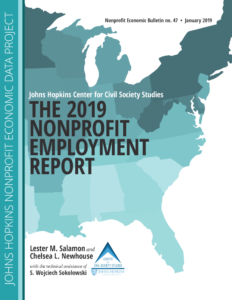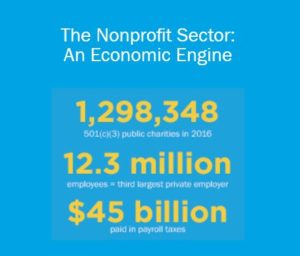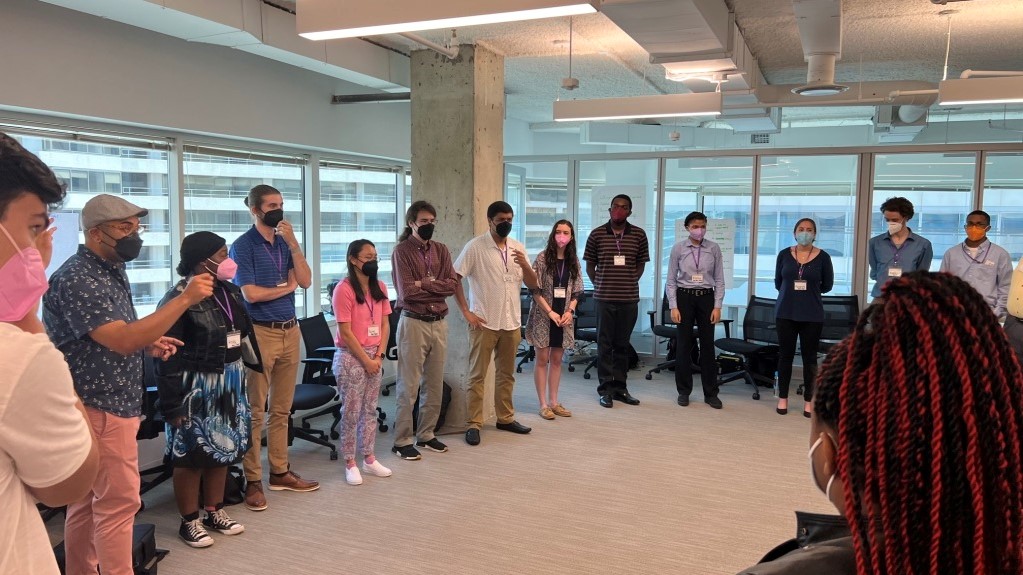It’s likely that if you ask someone what the fastest-growing industry is in the country, the nonprofit industry might not even make the list. It should. It’s one of the fastest-growing and it’s already the third-largest employer in the country.
The only two bigger industries are retail and hospitality. Between 2007 and 2016, nonprofit job growth outpaced for-profits by more than 12 percent. According to the 2019 Nonprofit Employment Report, that’s 12.3 million paid employees who work in the nonprofit sector.

“It exceeds all of manufacturing in terms of employment. That’s just such a striking atypical reality people aren’t aware of. In that sense, we continued to be surprised by the durability of those numbers,” says report author Lester M. Salamon, professor and director of the Center for Civil Society Studies at Johns Hopkins Institute for Health and Social Policy Studies.
“The second phenomenal thing is the rate of growth is faster than the for-profit sector. It’s counter-intuitive in some ways,” adds Salamon.
An economic engine and job-creator
“Most people think of nonprofits just as volunteers. We actually employ ten percent of the American workforce,” says Rick Cohen, chief communications officer and chief operating officer for the National Council of Nonprofits. “It is a large and diverse employer. Whatever it is that really is somebody’s passion you can find a job at a nonprofit doing that.”
“There is a wide array of nonprofits from soup kitchens and organizations that provide social services to crisis centers and some fairly large institutions like hospitals and my wonderful university,” Salamon says.

He credits nonprofits for “exceeding, quite strikingly,” at being a major economic player by diversifying how they generate income. Charitable giving is a small source, making up about ten percent of most nonprofits’ revenue overall.
The government accounts for close to 40 percent of support, he says, citing social services, research, and education as examples of areas where nonprofits fill the gap of services that the government cannot provide. Other sources include private fees, partnerships, and commercial sources.
“The partnership idea is basically a good idea. It uses the government for what it does best — raise money — and we have a tax system that does its job and doesn’t give it away to people who don’t need it. And we use nonprofits for what they do best, which is delivering service on a human scale,” Salamon says.
Job stability and higher-than-average wages
This balance makes the industry as stable — if not more so — when it comes to job security. Because nonprofits need many of the same skills that for-profits do, they’re forced to offer competitive wages.
“It’s hard to make the case that nonprofits are less secure than for-profits. I think they’re every bit as reliable as employers, maybe even more so,” he says. “Another surprising finding (of the study) is the average wage of nonprofit places of employment is higher than the average wage of for-profits in the same industries.”
Nonprofits pay 30 percent more than the retail industry, 60 percent more than the construction industry and 130 percent more than the hospitality industry, according to Salamon’s report.
Skills are transferable
Nonprofits in the health, education, and social services areas are growing the fastest right now. Many skills are considered transferable from for-profit to nonprofit: accounting, office management, communications, fundraising, advocacy, and front-line staffing. In terms of hot jobs, Cohen says, like many other industries, technology, and data professionals are in demand.
“Technology can be a nonprofit’s best friend, using data to help better target services,” he says. “One of the ways to stretch a dollar further is to make sure you’re focusing services where they’re needed. And data helps us determine if there’s a need to shift services three blocks west.”

What you need to know about switching careers
Those interested in transitioning to a career in nonprofits, the National Council of Nonprofits has curated tools and resources that can help someone start their nonprofit and manage one. Articlstions.
Salamon says while a lot of training tends to be field-related, there are skills that are covered in more formalized education, such as a business degree. Analytical and strategic thinking, research, and management are taught at 50 to 75 universities that have specific nonprofit training.
“You can think of this emergence of the nonprofit field similar to post-World War II’s field of business education taking off. The reason why: you had people running companies who were trained as scientists and engineers, and suddenly found themselves running large complicated organizations. They hadn’t been trained for that. They didn’t know how to run things, only build things,” Salamon says.
“People frequently who come out of social work schools or medical schools are very familiar with the substantive field but not how to do management jobs,” he continued. “Multiple sources of revenue, keeping an eye on the market, keeping an eye on the government, being skillful in trying to run a volunteer organization, appealing to donors these are really complicated jobs,” according to Salamon.
“So, what’s emerged is this field of nonprofit organizations, sometimes affiliated with schools of public admin, sometimes with schools of business administration, but wherever they are, it’s the type of training which is smart for someone who is going into the nonprofit field to master.”
A job and a sense of purpose
However, you train or enter into a career in nonprofits, there is something extra this field provides that you won’t find in another.
“We like to go back to that saying that if you love the work you do, you never work a day in your life. That’s one of the great opportunities in the nonprofit sector,” says Cohen. “You can get a competitive-paying job doing something you truly enjoy versus a job that may not be your passion. I don’t doubt many people in the for-profit world like what they do, but there’s a special sense of fulfillment that many in the nonprofit field get.”
Looking for a career in the nonprofit sector? Check out this National Council of Nonprofits job search link.
You may also like:
Soft skills will be invaluable in the future workplace
A sector where jobs are booming gets surprisingly little attention
Veterans find a continuing sense of purpose through volunteering in their communities
“We need to develop a people-centered, rather than task-centered, economy.”











